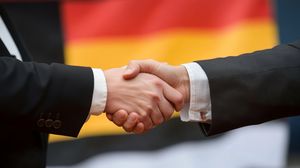KANBrief 2/25

The contract between the Federal Republic of Germany and the German Institute for Standardization was signed on 5 June 1975. This year therefore marks the 50th anniversary of the contract, which is still in force today. It is therefore fitting for us to take a closer look at the terms of the contract and its impact, however much it may appear retrospectively to be a dry legal transaction.
For a long time – almost 30 years after the Federal Republic of Germany was founded, and almost 60 years after creation of the first standards body in the country – Germany lacked a formal provision determining which of the various bodies involved in standardization constituted its national standards organization. Standardization work began in Germany in 1917, under the auspices of the Normenausschuß der deutschen Industrie (Standardisation Committee of German Industry). By the 1960s, standardization had acquired a new dimension: with Germany now embedded in the European Economic Community and with the onset of globalization, standards were increasingly being used to eliminate barriers to trade and promote economic growth through world trade. As a consequence, standardization acquired global importance and became an important factor in the industrial policies of the countries pursuing it. In Germany, standards were also found to be useful for describing technical requirements for the justice system and public administration, thus reducing the burden on state institutions.
Known by then as the Deutscher Normenausschuss (German Standardization Committee), the organization was given its current name – the Deutsches Institut für Normung (German Institute for Standardization), or DIN for short – in the run-up to signing of the contract in 1975. At that time, DIN was undisputedly the most important standards organization in Germany: both in general terms and, in conjunction with the German Association for Electrical, Electronic & Information Technologies (VDE) and its standardization organization, the DKE, specifically in the field of electrical standardization. DIN was also already a member of the European and international standardization organizations CEN/CENELEC and ISO/IEC. Its de-facto status was recognized comprehensively by the German Federal Government in the contract, and has never been challenged since. The contract accords DIN the status of responsible standards body for the Federal Republic of Germany and stipulates that, as a member of the non-governmental international (and thus also European) standards organizations, it officially represents Germany in standardization matters.
Besides these rights, the contract also imposes obligations on DIN. The first of these is the comprehensive duty to consider the public interest during standardization activity. This enables groups primarily representing social interests (in contrast to commercial enterprises) to participate in standardization work. Such interests include environmental protection, consumer protection and, of course, occupational safety and health, all of which acquired new weight in standardization as a result of the contract between DIN and the German state. In fact, representatives of occupational safety and health are treated by DIN as a stakeholder group in its own right – a privilege not granted to them by any other standards organization. The parties assigned to this stakeholder group are in the first instance the representatives of KAN and of the DGUV and its member institutions.
DIN’s duty to consider the public interest has given rise to the instrument of the block vote for stakeholders representing public interests in standardization. The block vote means that in the absence of a consensus, a German standards committee is prohibited from taking a decision that is contrary to the unanimous vote of any individual stakeholder group. This is one reason (among others) why the provisions of the contract between DIN and the German state are still effective today – and are anything but trivial.
DIN also has a direct obligation to the state by virtue of the contract. The German government must, for example, be involved in DIN’s steering committees and standards committees. Where the subject of standardization activity falls within their remit, public authorities must be involved in it. Furthermore, requests by the German government for standardization work must be accorded priority. In return, standardization work receives funding from the German government.
With conclusion of the contract, DIN and the German government embarked on a path of their own. As a result, DIN – a body funded by industry – remained an association, also retaining its autonomy from the state. By contrast, other countries nationalized their national standards organizations around that time, or bound them by legislation. The final paragraph of the contract between DIN and the German government shows that the ensuing cooperation between the two can be viewed retrospectively as a great success: since the end of 1976, both DIN and the German government have waived their right each year to terminate the contract.
Freeric Meier
meier@kan.de